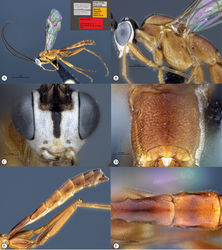Cryptopimpla goci
| Notice: | This page is derived from the original publication listed below, whose author(s) should always be credited. Further contributors may edit and improve the content of this page and, consequently, need to be credited as well (see page history). Any assessment of factual correctness requires a careful review of the original article as well as of subsequent contributions.
If you are uncertain whether your planned contribution is correct or not, we suggest that you use the associated discussion page instead of editing the page directly. This page should be cited as follows (rationale):
Citation formats to copy and paste
BibTeX: @article{Berry2016ZooKeys, RIS/ Endnote: TY - JOUR Wikipedia/ Citizendium: <ref name="Berry2016ZooKeys">{{Citation See also the citation download page at the journal. |
Ordo: Hymenoptera
Familia: Ichneumonidae
Genus: Cryptopimpla
Name
Cryptopimpla goci Reynolds Berry & van Noort sp. n. – Wikispecies link – ZooBank link – Pensoft Profile
Type material
HOLOTYPE ♂: South Africa, Western Cape, Koeberg Nature Reserve, 33°37.622'S, 18°24.259'E, 741m, 3 - 31 October 1997, S. van Noort, KO97-M12, Malaise trap, West Coast Strandveld, SAM-HYM-P0474345 (SAMC).
Description
Body subpolished. Colour. Head white with a median black band on the face, frons, reaching around ocelli and occiput black, not reaching the eyes. Body mostly fulvous, mesoscutum black anteromedially, extending about 0.8 length of mesoscutum.
Head. Finely punctate. Frons unarmed. Setae on head and clypeus short and sparse. Flagellum tapered to a slender apex. Clypeus profile convex, bulbous. Clypeus edge convex. Upper tooth of mandible longer than the lower tooth. Tentorial pits large and distinct. Eye in lateral view 0.69 times as long as wide, narrow in anterior view with maximum width 0.4 times shortest inter-ocular distance.
Mesosoma. Mesosocutum moderately punctate. Scuto-scutellar groove broad. Epicnemial carinae present ventrally and dorsally, dorsally converging toward anterior edge of mesopleuron. Propodeum with anterior margin medially straight, carination include pleural carinae and a well-defined posterior transverse carina. Wings hyaline; fore wing with two bullae closely situated appearing as one; vein 2m-cu sinuate; areolet anteriorly truncate-shaped. Hind wing with one basal hamulus and seven distal hamuli.
Metasoma. Depressed; tergum 1 impunctate with distinct dorsolateral carinae present as a carina ventrad of spiracle, with a secondary carina leading from the ventral carina to the spiracle, posterior margin weakly convex; second tergum 1.21 times longer than broad, spiracle situated at basal 0.35 of tergum (measured in lateral view), gastrocoeli elongate.
CT 1.8; ML 0.75; IO 1.6; OO 1.1; Fl1 3.9; body length 7.5 mm; antenna length 7.2 mm; fore wing length 5.3 mm.
Differential diagnosis
Cryptopimpla goci is immediately distinguishable from all other Afrotropical Cryptopimpla species by having a colour combination of a largely fulvous body, with a white head. A short distinct carina leads to the spiracle from the base of a single carina ventrad of the spiracle which is unique in this species. Cryptopimpla goci is closely-related to Cryptopimpla kogelbergensis as both species (goci species-group) share a truly distinctive and well-defined posterior transverse carina, possess pleural carinae, a convex and bulbous clypeus without a curved lip on the ventral margin, and large tentorial pits distinguishing them from all other Afrotropical Cryptopimpla species in the rubrithorax species-group. The head is finely punctate, the maximum width of the eye in anterior view 0.38 times the shortest inter-ocular distance; the malar space 0.75 times the basal mandibular width; the length of the first flagellomere 3.9 times longer than wide; 2m-cu on the fore wing is sinuate; metasomal tergum 1 with a short distinct carina that leads to the spiracle from the base of a single carina ventrad of the spiracle; the second tergum 1.21 times longer than wide with elongate gastrocoeli separates Cryptopimpla goci from Cryptopimpla kogelbergensis where the head is smooth, the maximum width of the eye is much broader at 0.6–0.63 times the shortest inter-ocular distance; the malar space is 1.2 times the basal mandibular width; the length of the first flagellomere is 6.1–6.8 times longer than wide; vein 2m-cu on the fore wing is straight; dorsolateral carinae on the metasomal tergum 1 are substituted with longitudinal wrinkles and the second tergum is 1.0–1.04 times as long as wide with the gastrocoeli small and indistinct.
Etymology
Named after the late Nosiphiwo Goci who worked as a research assistant in the Natural History Department of the Iziko South African Museum for over 17 years and whose immense contribution to the curation and digitization of the SAMC Hymenoptera collection warrants recognition. Noun in the genitive case.
Distribution
South Africa (Western Cape).
Comments
A rare species known only from one specimen collected in West Coast Strandveld in the Koeberg Nature Reserve as part of a continuous 13 month sampling inventory of the reserve using a variety of methods including Malaise traps, yellow pan traps and sweeping. Similar intensive sampling in other areas of the Cape Floral Kingdom, including sampling West Coast Strandveld at numerous other localities, produced no further specimens.
Original Description
- Berry, T; van Noort, S; 2016: Review of Afrotropical Cryptopimpla Taschenberg (Hymenoptera, Ichneumonidae, Banchinae), with description of nine new species ZooKeys, (640): 103-137. doi
Images
|
